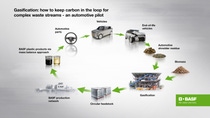Plastics & Rubber
Turning Plastics Waste into Circular Materials with Gasification: A New Chapter in Automotive Sustainability
In a quiet corner of Europe, a transformative pilot project has followed an entirely new pathway in automotive recycling. An automotive manufacturer, together with BASF, BEST Bioenergy and Sustainable Technologies GmbH, has successfully completed a groundbreaking initiative that could reshape how we think about vehicle waste.
The Challenge: Complex Waste, Limited Options
Every year, approximately 5 million cars reach their end-of-life status in Europe. This represents significant recycling potential. However, the current car recycling generates a tangled mess of materials - foams, plastics, films, and paint particles known as automotive shredder residue (ASR). Traditionally, this waste has only one destination: incineration or landfills. Too complex to recycle mechanically, it leaves behind a pile of unused resources waiting for a second chance.
The Breakthrough: Chemical Recycling
For the first time, this pilot project replaced fossil feedstocks entirely with circular resources, including automotive waste and biomass like wood. Using advanced gasification technology, a form of chemical recycling that transforms mixed waste into high-quality raw materials. BASF then converted this feedstock and produced polyurethane for new steering wheels.
This was not just a technical success, it was a strategic leap. The recycled materials met the stringent standards required for safety-relevant components, proving that sustainability does not have to compromise performance.
The Proof: Feasibility, Emissions Reduction
ETH Zurich and BASF have demonstrated that it is not only feasible to recycle mixed automotive plastic waste and biomass. It also results in significant reduction of CO2. The recycling of 1 kg of automotive shredder residue with 3 kg of biomass reduces greenhouse gas emissions by more than 3 kg CO2-eq compared to incineration with energy recovery. Ultimately, co-gasification of mixed plastic waste and bio-waste produces valuable feedstock for the chemical industry, reduces fossil resource consumption, and keeps carbon in the loop.
The Vision: Circularity in Motion

When automotive manufacturers want to embed circularity deep into their production processes, they need to work in close resource loops and reduce reliance on virgin materials. This pilot project is a key step in that journey, offering a scalable, high-quality alternative to traditional recycling methods.
The project also marks a milestone in defossilization. By using only non-fossil raw materials and converting complex wastes via gasification, it demonstrates how industries can transition away from petroleum-based resources. The mass balance approach ensures traceability and certification, making it easier for manufacturers to adopt these innovations without disrupting existing production systems.


